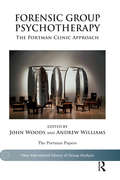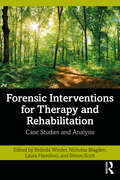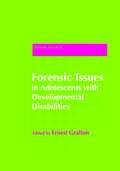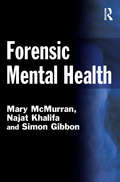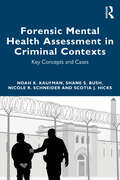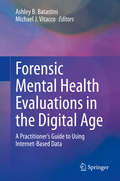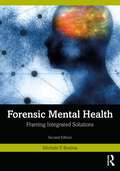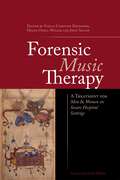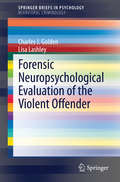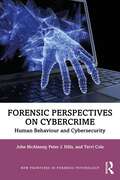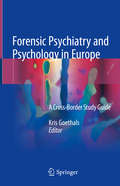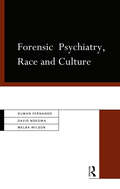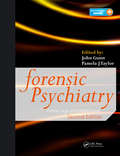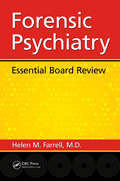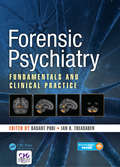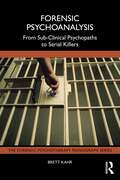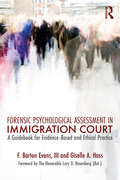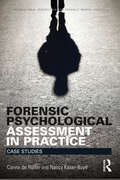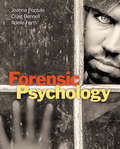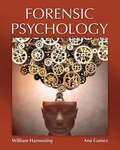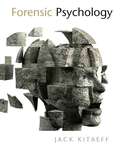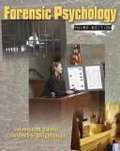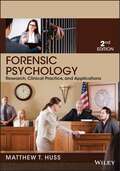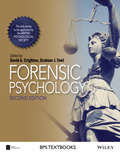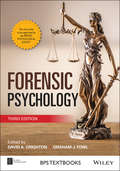- Table View
- List View
Forensic Group Psychotherapy: The Portman Clinic Approach (The New International Library of Group Analysis)
by John WoodsThis book is about the practice and underlying theory of psychodynamic group therapy as undertaken in the Portman Clinic. It offers an overview of various matters requiring sophisticated thinking in the structuring of forensic group psychotherapy.
Forensic Interventions for Therapy and Rehabilitation: Case Studies and Analysis
by Nicholas Blagden Belinda Winder Laura Hamilton Simon ScottForensic Interventions for Therapy and Rehabilitation: Case Studies and Analysis provides an up-to-date overview of the latest therapeutic ideas being used for forensic service users and prisoners in both custodial and community settings. The field of forensic work is increasingly being recognised for its importance, both in terms of the value of the work in reducing reoffending and in terms of the salience given to it by the media, the public, and politically. This text reflects current policy and practice, and furthermore considers the therapeutic encounter from a broad perspective, which incorporates individual, group, and systemic interventions. Forensic Interventions for Therapy and Rehabilitation includes chapters on a range of therapeutic models, issues pertinent to specific groups of people with criminal convictions, and discussion on the various contexts in which interventions take place. Forensic Interventions for Therapy and Rehabilitation is essential reading for all students of Forensic or Clinical Psychology, as well as practitioners in the field.
Forensic Issues in Adolescents with Developmental Disabilities
by Ernest GraltonAdolescents with developmental disabilities are a complex population who require specialised treatment and care. This interdisciplinary text examines the processes involved in working with this client group in forensic settings, and explores the ways in which their needs differ from those of other young people who engage in high risk behaviour or offending. The book covers assessment, intervention and treatment options for adolescents with a wide range of developmental disabilities, including autism spectrum disorders, acquired brain injury, developmental traumatology, and complex comorbidities. It describes the obstacles, challenges and opportunities to consider when working with this population, and the role played by various professionals, including forensic psychiatry and psychology, occupational therapy, physiotherapy, education, art psychotherapy and social work. The book also outlines the issues to consider when working in secure and community settings as well as the legal aspects of working with this client group, and the complex issues surrounding risk assessment. The first comprehensive account of forensic issues in adolescents with developmental disabilities, this book will be an indispensible primary resource for a wide range of professionals, including child and adolescent psychiatrists, community psychiatric nurses, developmental paediatricians, social workers and youth workers, lawyers and advocates.
Forensic Mental Health (Criminal Justice Series)
by Mary McMurran Najat Khalifa Simon GibbonThis book provides a concise introduction to the increasingly important field of forensic mental health. It aims to set out both the key concepts in forensic mental health as well as the way the discipline operates in the broader context of criminal justice and mental health care systems. It will provide an ideal introduction to the subject for students taking courses in universities and elsewhere, for mental health practitioners in the early stages of their careers, and for professionals from other agencies needing an informed and up-to-date account of forensic mental health.
Forensic Mental Health Assessment in Criminal Contexts: Key Concepts and Cases
by Noah K Kaufman Shane S Bush Nicole R. Schneider Scotia J. HicksThis valuable compendium advances the understanding of mental health case law, making it highly accessible to practicing forensic professionals. Divided into two parts, the first section focuses on explaining important topics related to forensic psychological and forensic neuropsychological assessment, while the second section stands on its own as a collection of fascinating legal cases with high relevance to mental health and legal professionals interested in how mental health disorders impact criminal behavior among juveniles and adults. The book begins with an accessible primer on abnormal behavior, exploring the links between criminal behavior and mental health disorders. It goes on to thoroughly describe what goes into forensic psychological and forensic neuropsychological evaluations, including discussion about the Federal Rules of Evidence, as they pertain to evidence-generation during the mental health evaluation process. The book also focuses on psychometric concepts, including reliability, validity, sensitivity, and specificity, as well as an exploration of ‘science’ and ‘the law’ which includes a discussion about the difference between science and pseudoscience, the different sources of law (constitutions, statutes, and case law), and how the intellectually competitive practice of law is similar to the enterprise of science. Ethical issues faced by the forensic mental health worker are also addressed. The second section of the book, Legal Cases for the Forensic Mental Health Professional, is an alphabetical summary of important and interesting legal cases with relevance for mental health professionals. These cases offer real-world significance while summarizing complex legal decisions through a neuropsychological sieve, to allow both legal and psychological communities to better understand each other’s professions. This book will be an invaluable resource for forensic psychologists, forensic neuropsychologists, forensic psychiatrists, and other mental health professionals whose work brings them into contact with the juvenile justice and adult criminal justice system. It will also be of interest to legal professionals, criminal justice departments, and law schools.
Forensic Mental Health Evaluations in the Digital Age: A Practitioner’s Guide to Using Internet-Based Data
by Ashley B. Batastini Michael J. VitaccoThis is the first book devoted to the use of social media and other internet-derived data in forming forensic clinical opinions of behavior. Designed for mental health practitioners, it outlines the challenges and the benefits of incorporating digital information in forensic assessments. It offers best practice guidelines geared to both criminal and civil psycho-legal questions. Each chapter includes a brief overview of the psycho-legal issues, clinical applications of consulting internet-based data, ethical and legal considerations and real life, de-identified case examples. This book provides guidance to the clinician in an emerging technological environment in which there are few resources, and ensures a more scientific and legally sound practice.
Forensic Mental Health: Framing Integrated Solutions
by Michele P. BratinaIn this book author Michele P. Bratina demonstrates how the Sequential Intercept Model (SIM) supports integration of the U.S. healthcare and justice systems to offer more positive outcomes for offenders with mental illness. The book describes a criminal justice–mental health nexus that touches every population—juvenile and adult male and female offenders, probationers and parolees, the aging adult prison population, and victims of crime. In the United States today, the criminal justice system functions as a mental health provider, but at great cost to society. The author summarizes the historical roots of this crisis and provides an overview of mental illness and symptoms, using graphics, case studies, and spotlight features to illustrate the most pressing issues encountered by justice and behavioral health professionals and the populations they serve. Forensic Mental Health takes a multidisciplinary approach, addressing social work, psychology, counseling, and special education, and covers developments such as case law related to the right to treatment and trauma-informed care. Designed for advanced undergraduates, this text also serves as a training resource for practitioners working with the many affected justice-involved individuals with mental illness and co-occurring substance use disorders, including juveniles and veterans.
Forensic Music Therapy: A Treatment for Men and Women in Secure Hospital Settings
by Lindsay Jones Estela Welldon John Adlam Ian Merrick Rebecca Lawday Stella Compton-Dickinson Helen Odell-Miller Manjit Gahir Alex Maguire Lyndsay Jones Sarah Hill Rebecca Roberts Victoria Sleight Irene Cormac Phyllis Annesley Philip Hughes Petra HerveyForensic Music Therapy demonstrates diverse and innovative approaches, which include live, improvised and pre-composed music, from music therapy teams working in secure treatment settings. The book covers clinical development, research, supervision and discussion of institutional and multi-disciplinary team dynamics. It will inform professionals about different ways to manage challenging situations in order to deliver music therapy with adults and adolescents who have committed offences, men and women with personality disorders and mental health problems, as well as men who have killed. The book also describes the development of Cognitive Analytic Music Therapy: the first manualised form of music therapy to be used in the rehabilitation of offenders. Chapters include case studies and service developments informed by theories from an established range of psychological therapies including psychoanalysis, cognitive analytic therapy, musicology and forensic psychotherapy. The significant variations and considerations when working in low, medium and high secure treatment settings are also clarified. This book will give music therapists, forensic and clinical psychotherapists and psychologists, cognitive analytic therapists, psychiatrists, and others working in the field a wider understanding of choices, as well as demonstrating the effectiveness of tailored music therapy programmes for this complex client group.
Forensic Neuropsychological Evaluation of the Violent Offender
by Charles J. Golden Lisa LashleyThis book focuses on the importance of using a brain-behavior relationship framework for the successful use of neuropsychological evaluations for courtroom purposes. It stresses the need to understand the offender as a unique individual assessed accordingly from cognitive and personality perspectives. The desired goal is to reach a more nuanced evaluation rather than a compilation of test scores. This book clearly explains the circumstances that prevent proper testing including batteries that are confusing or frustrating to the person being tested or those that cause fatigue thus interfering with an appropriate picture of cognitive, motor and sensory skills. Irrelevance of some tests for addressing the reason for referral is also covered as is the importance of setting and adequate time for evaluation. When dealing with court cases involving the violent offender the evaluation is critical to the establishment of the factors that motivated the crime In most cases the issue is not insanity but rather an understanding for legal purposes of the cognitive and emotional processes that explain how a crime occurred This book provides a concise overview of the issues involved and how to provide the best scientific information to satisfy the pursuit of justice.
Forensic Perspectives on Cybercrime: Human Behaviour and Cybersecurity (New Frontiers in Forensic Psychology)
by Peter J. Hills Terri Cole John McAlaneyForensic Perspectives on Cybercrime is the first book to combine the disciplines of cyberpsychology and forensic psychology, helping to define this emergent area. It explores the psychological factors that influence the behaviour of all those involved in cybersecurity, drawing upon the research literatures in relevant areas including forensic, social, and cyberpsychology.Written by leading figures in the field, the book provides an introduction to the cybercrime ecosystem, before discussing the psychological manipulation of targets through social engineering techniques and highlighting the unique threats that this type of attack presents. The reasons why people become involved in hacking are explored, and the authors review research literature on risk factors of being a victim of cybercrime, along with the concept of resilience. Behaviour change and prevention strategies are also evaluated, as well as the role of emergent technologies such as artificial intelligence and what this may mean for the role of humans in cybersecurity. Case studies and real-world examples are woven throughout to illustrate key issues, opportunities, and challenges.This unique text is a must-read for students undertaking any degree that relates to behaviour and cybersecurity, including psychology, computing, law, and business management. It is also highly relevant to researchers, practitioners, and policymakers who work in cybersecurity and/or have an interest in empowering people to be safe online.
Forensic Psychiatry and Psychology in Europe: A Cross-border Study Guide
by Kris GoethalsThis study guide aims to make European trainees in forensic psychiatry and psychology and young forensic psychiatrists and psychologists aware of the differences and commonalities in forensic psychiatry and psychology in different countries within Europe and to enable them to learn from the approaches adopted in each country. The guide is divided into five main sections that address legal frameworks, service provision and frameworks, mandatory skills, teaching and training in forensic psychiatry and psychology, and capita selecta. In addition, recommendations are made with respect to the practice of teaching and training across European countries. It is anticipated that the guide will provide an excellent means of improving specific skills and that, by learning about the offender/patient pathways in the different jurisdictions of Europe, the reader will gain a deeper understanding of the principles that govern methods and practices in their own work with mentally disordered offenders.
Forensic Psychiatry, Race and Culture
by Melba Wilson Suman Fernando David Ndegwa Dr Suman FernandoForensic psychiatry is the discipline which distinguishes the 'mad' from the 'bad', but are its values inherently racist? Why are individuals from non-Western backgrounds over-represented statistically in those diagnosed with schizophrenia and other serious illnesses? The authors argue that the values on which psychiatry is based are firmly rooted in ethnocentric Western culture, with profound implications for individual diagnosis and systems of care.Through detailed exploration of the history of psychiatry, current clinical issues and present public policy, this powerful book traces the growth of a system in which non-conformity to the prevailing cultural norms risks alienation and diagnosis of mental disorder.
Forensic Psychiatry: Clinical, Legal and Ethical Issues, Second Edition
by John Gunn Ian D. Hutcheon Pamela TaylorHighly Commended, BMA Medical Book Awards 2014Comprehensive and erudite, Forensic Psychiatry: Clinical, Legal and Ethical Issues, Second Edition is a practical guide to the psychiatry of offenders, victims, and survivors of crime. This landmark publication has been completely updated but retains all the features that made the first edition such a w
Forensic Psychiatry: Essential Board Review
by Helen Mavourneen Farrell M.D.An invaluable study guide for doctors preparing for the forensic psychiatry board exam or for those seeking recertification, this book is a concise and practical aid for mastering forensics, making key principles easy to understand and memorize. The book offers readers important advice on everything from registering for the examination to effective studying techniques. It provides a broad review of important forensic psychiatry topics as well as important mental health legal cases. It also includes more than 100 board-style questions along with answers and detailed explanations for self-assessment.
Forensic Psychiatry: Fundamentals and Clinical Practice
by Basant Puri Ian H. TreasadenThis book covers the basic science and neurobiology of violence and integrates this with clinical, legal, and ethical aspects of forensic psychiatry. Unique text which integrates the basic sciences, clinical, legal, and ethical aspects Highly illustrated. Numerous colour images in the basic sciences section further explain the text Succinct yet comprehensive coverage for instant access to the information The book is designed for postgraduate trainees in psychiatry wishing to specialise in forensic psychiatry, specialists in forensic psychiatry, mental health, criminal lawyers, and forensic psychologists. It will be an invaluable reference work for clinical psychologists, criminologists, sociologists, and other professionals working with forensic psychiatric patients such as members of the probation service, social workers, and nursing staff.
Forensic Psychoanalysis: From Sub-Clinical Psychopaths to Serial Killers (The Forensic Psychotherapy Monograph Series)
by Brett KahrForensic Psychoanalysis examines the traumatic psychological origins of violence and explores the ways in which such disasters can be prevented and treated.The book encapsulates Professor Brett Kahr’s lengthy career in the field of forensic mental health, investigating all aspects of this vital arena, from the history of criminality to the current-day application of psychoanalysis and psychodynamic psychotherapy to the care of rapists, arsonists, genital exhibitionists, paedophiles, and murderers. This gripping text surveys more than one century of literature on the psychotherapeutic treatment of the criminally insane and provides tremendous insight into how mental health professionals can contribute to the reduction of global violence.Forensic Psychoanalysis will be crucial for all readers interested in both the prevention of criminality and its psychological treatment.
Forensic Psychological Assessment in Immigration Court: A Guidebook for Evidence-Based and Ethical Practice
by Barton F. Evans, III Giselle A. HassForensic Psychological Assessment in Immigration Court is an essential specialized guide for psychologists and clinicians who work with immigrants. Immigration evaluations differ in many ways from other types of forensic assessments because of the psycholegal issues that extend beyond the individual, including family dynamics, social context, and cross-cultural concerns. Immigrants are often victims of trauma and require specialized expertise to elicit the information needed for assessment. Having spent much of their professional careers as practicing forensic psychologists, authors Evans and Hass have compiled a comprehensive text that draws on forensic psychology, psychological assessment, traumatology, family processes, and national and international political forces to present an approach for the effective and ethical practice of forensic psychological assessment in Immigration Court.
Forensic Psychological Assessment in Practice: Case Studies (International Perspectives on Forensic Mental Health)
by Corine de Ruiter Nancy Kaser-BoydForensic Psychological Assessment in Practice: Case Studies presents a set of forensic criminal cases as examples of a scientist-practitioner model for forensic psychological assessment. The cases involve a number of forensic issues, such as criminal responsibility, violence risk assessment, treatment planning, and referral to long term forensic care. Likewise, different types of offenses are covered, for example, sexual offending, arson, homicide, robbery and domestic violence. The authors address a variety of mental disorders including psychosis, posttraumatic stress disorder, psychopathy and other personality disorders. The book will be useful for novice and experienced forensic psychologists and psychiatrists who are looking for case studies that integrate the most recent empirical evidence with psychological test findings.
Forensic Psychology
by Craig Bennell Joanna Pozzulo Adelle ForthForensic Psychology takes a broad-based perspective, incorporating both experimental and clinical topics. This text includes current developments by theorists and researchers in the field. By focusing on multidisciplinary theories, readers gain an understanding of different forensic psychology areas, showing interplay among cognitive, biological, and social factors. Readers will find that the ideas, issues, and research in this text are presented in a style that they will understand, enjoy, and find useful in their professional careers.
Forensic Psychology
by William Harmening Ana GamezForensic Psychology is designed for use in forensic psychology courses and can also be incorporated in sociology, criminology, or criminal justice courses. <p><p> To educate and inform readers on the rapidly evolving forensic psychology field, Forensic Psychology breaks the discipline into five distinct categories―police psychology, investigative psychology, criminal psychology, correctional psychology, and legal psychology. While each section is addressed separately, it clearly illustrates how all five are integrated in the practices of the criminal and civil justice system. <p><p> A balanced approach gives readers the tools to understand forensic psychology principles today, and into the future. Each section discusses the major issues that define each subspecialty from a behavioral perspective. Every chapter features real-life case examples to engage the reader. Informative and thorough, Forensic Psychology will help students gain unique insight into criminal justice professional best practices, as well as forensic psychology principles, theory, and recent research.
Forensic Psychology
by Jack KitaeffThis book presents a clear, complete picture of forensic psychology, covering both psychological and legal principles, and demonstrating their connections through actual case law and clinical examples. Dr. Jack Kitaeff first reviews the field’s history, and the roles, responsibilities, and obligations of practitioners. Next, he addresses criminological aspects of forensic psychology, examining theories of aggression and violent crime; non-violent crimes; and topics ranging from serial killing to terrorism. He thoroughly reviews forensic psychologists’ roles in law enforcement and the U.S. criminal justice system, and covers crucial issues such as repressed memories, novel syndromes, the workplace, children, families, and treatment.
Forensic Psychology
by Solomon M. Fulero Lawrence S. WrightsmanWritten by two of the leading authorities in the field, FORENSIC PSYCHOLOGY, Third Edition introduces you to the practice of forensic psychology by showing how psychologists aid the legal system by serving as expert witnesses, criminal profilers, and trial consultants for jury selection and child custody hearings. Wrightsman and Fulero present the roles and responsibilities of forensic psychologists, and address both the opportunities and temptations inherent in those roles. Through this lens, the authors explore the ethical issues facing practicing forensic psychologists, such as promising clients too much, the possibility of becoming advocates rather than objective scientists, and the pitfalls associated with substituting one's values for data. The authors provide an accurate and candid picture of the field, and the range of careers in forensic psychology.
Forensic Psychology
by Matthew T. HussForensic Psychology, 2nd Edition provides students with an in-depth and insightful introduction to the clinical practice of forensic psychology, the assessment and treatment of individuals who interact with the legal system. This textbook was designed to focus on the more narrow or traditional definition of forensic psychology― the practice of forensic clinical psychology.
Forensic Psychology (BPS Textbooks in Psychology #1)
by Graham J. Towl David A. CrightonUpdated to reflect recent changes in the field, the 2nd Edition of Forensic Psychology presents a comprehensive overview of forensic psychology and its applications in the civil and criminal justice systems of the UK. Builds on the first edition to convey material in an engaging manner to postgraduate students in psychology Includes a significant expansion of pedagogical features, including text boxes highlighting key seminar issues and key debates in the field to further group discussion Provides an up-to-date summary of emerging evidence in the field, and its implications for evidence based practice Points to additional online learning resources at the conclusion of each chapter
Forensic Psychology (BPS Textbooks in Psychology #1)
by Graham J. Towl David A. CrightonFORENSIC PSYCHOLOGY Explore the theory, research, and practice of forensic psychology with this collection of resources from recognized leaders in the fieldThe newly revised Third Edition of Forensic Psychology delivers insightful coverage of the theory and applications of forensic psychology. The book combines authoritative scholarship with an unprecedented breadth of international coverage and constitutes an essential resource for all aspects of contemporary forensic and criminal psychology.The new edition addresses issues of equality, diversity, and inclusion in each section, as well as the uses and abuses of power in forensic contexts. The book takes a constructively critical approach to the dominant theories, policy, and practices of today, as opposed to being merely descriptive, and considers new and developing areas, like the prevention of sexual violence at universities.Forensic Psychology comprehensively addresses the application of modern forensic techniques and practices to the civil and criminal justice systems in the United Kingdom. Each chapter concludes with some specific suggestions for further reading. Additionally, readers will enjoy the inclusion of a wide variety of topics, like:A thorough discussion of investigative and clinical practice, including the politics of forensic psychology, offender profiling, eyewitness testimony, and jury decision makingAn examination of clinical and risk assessments, including reviews of the key legal issues and principles involved in risk assessments, the role of structured instruments and protocols, and coverage of actuarial and structured clinical methodsDiscussions of working with criminalized populations in prisons and forensic mental health facilitiesA treatment of psychology in the courts with an emphasis on the courts of England and WalesPerfect for graduate level students in forensic psychology courses, Forensic Psychology will also earn a place in the libraries of qualified forensic psychologist practitioners and postgraduate students seeking to improve their understanding of forensic psychology with a high-quality international textbook underpinned by considerations of human rights and ethical standards.
